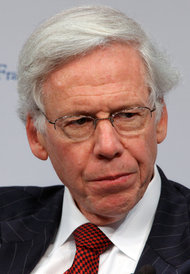HONG KONG — The American film “Django Unchained” was abruptly pulled from theaters in China on Thursday, its opening day, a surprising move that underscored the fragility of Hollywood’s evolving relationship with the Chinese movie industry.
No official reason was given for the decision to suspend “Django Unchained,” which was written and directed by Quentin Tarantino and won two Oscars in February. But there was talk among some people in the industry that brief nudity in one or two scenes had offended Chinese officials. The move comes after some scenes were reported to have already been edited to conform with the wishes of Chinese censors.
Workers at Beijing theaters said the film, which tells a bloody revenge story set in America’s pre-Civil War South, had been pulled because of unspecified technical problems.
But Mr. Tarantino’s representatives and financial backers in Los Angeles and New York on Thursday were still scrambling to learn what had gone wrong, and looking for a way to reopen their movie in what has become the world’s second-largest film market, after the United States. An industry insider said Friday that the film and not been banned, and there was still a chance it could be shown officially in mainland China. American film studios are seeking increased access to the vast new audience in China as a way to shore up their business, but have often been frustrated by Chinese laws, customs and tastes.
“We regret that ‘Django Unchained’ has been removed from theaters and are working with the Chinese authorities to determine whether the film can be rescheduled,” Steve Elzer, a spokesman for Sony Pictures Entertainment, which released the film, said in a statement. Mr. Elzer declined to discuss possible reasons for the cancellation.
“Django Unchained” was to have made its debut after weeks of heavy promotion. News reports have said that some of the film’s graphic violence was edited to make it acceptable to state censors, including altering the color of fake blood in violent scenes and limiting how far the blood splattered.
Such revisions are becoming increasingly common before American films are shown in China, with American filmmakers adhering to the demands of Chinese censors.
Sony’s indication that “Django Unchained” may be rescheduled suggested some relatively narrow problem, rather than broad objections to the movie’s celebration of rebellion.
The film focuses on a slave, Django, and a bounty hunter who try to outsmart a particularly brutal slave owner. It was released last year in the United States, and pirated DVD’s of that version have been on sale in shops on the mainland for weeks or months.
Before the film’s planned opening, the Chinese media quoted a Sony Pictures official who described the changes made to appease censors and suggested that Mr. Tarantino had played a role in the changes.
“What we call bloodshed and violence is just a means of serving the purpose of the film, and these slight adjustments will not affect the basic quality of the film — such as turning the blood to a darker color, or lowering the height of the splatter of blood,” Zhang Miao, director of Sony Pictures’ Chinese branch, told Southern Metropolis Daily. “Quentin knew how to adjust that, and it’s necessary that he is the one to do it. You can give him suggestions, but it must be him.”
Mr. Tarantino, whose films are known for their no-holds-barred depictions of gory violence, has not commented on reports that he toned the film down for Chinese censors.
His agents at William Morris Endeavor Entertainment declined on Thursday to discuss the film’s withdrawal.
Chinese media and film blogs were filled with speculation that the movie had been withdrawn because state censors somehow missed a brief scene with nudity. Some industry insiders have also discussed that possibility. If that turns out to be the case, then it would be surprising, given the careful vetting the film is said to have undergone before it was approved for release.
The longest scene with nudity in the film is one in which a naked Django, played by Jamie Foxx, is tied up and about to be castrated. There is also a shorter scene in which the main female character, Broomhilda, played by Kerry Washington, is dragged naked from an underground chamber.
Whatever the reason for the film’s withdrawal, the last-minute nature of the decision was surprising. Potential problems with Chinese censors are usually identified and addressed long before the film’s opening.
“Django Unchained” is the first of Mr. Tarantino’s violent movies to be cleared for distribution in Chinese theaters, though parts of his “Kill Bill” movies were filmed in Beijing.
Its sudden disappearance from theaters across the country prompted consternation even among some of the Chinese government’s staunchest defenders.
Gerry Mullany reported from Hong Kong and Michael Cieply from New York. Keith Bradsher contributed reporting from Hong Kong, and Edward Wong contributed reporting from Berkeley, Calif. Amy Qin and Sue-Lin Wong contributed research from Beijing.
Article source: http://www.nytimes.com/2013/04/13/business/media/Mystery-Surrounds-Withdrawal-of-Django-Unchained-in-China.html?partner=rss&emc=rss
